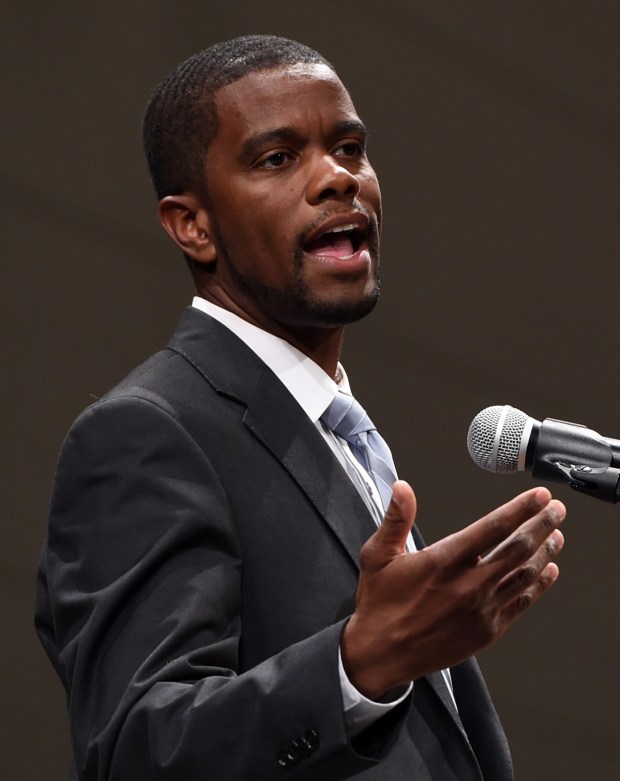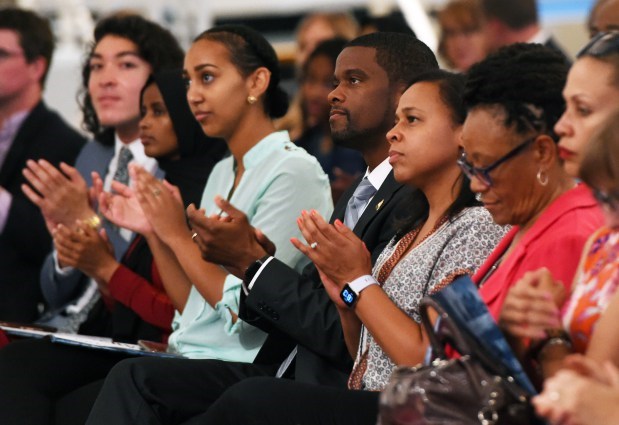
Friday August 10, 2018
By Tad Vezner

St. Paul Mayor Melvin Carter
delivers his 2019 Budget Address at Washington Technology Magnet School
in St. Paul, Thursday, Aug. 9, 2018. (Scott Takushi / Pioneer Press)
St. Paul Mayor Melvin Carter proposed a budget for next year that
includes no new cops but hefty investment in affordable housing, new
streets, and legal help for immigrants — and a 11.5 percent property tax
increase.
“In an increasingly polarizing national landscape, we must be
champions of local unity, and move forward together in building a city
that meets our needs today, but also creates a St. Paul of the future
that our children, and grandchildren want to live in,” Carter said
during a speech at Washington Technology Magnet School in the city’s
North End. “To realize this vision, we need a city budget that reflects
our values and invests in a future for all of us.”
City officials said the tax increase equates to an extra $76 for the
owner of a median-value home ($186,200). In all, it equates to an
additional $37 million in spending over last year’s $569 million budget,
$16 million of which would be paid through the proposed increase in
taxes.
Carter also said he had identified $2.5 million in spending
decreases, using as an example the $100,000 saved for not having a July
4 fireworks display this year. Additionally, the mayor said the city
would not backfill many vacant positions, defer technology purchases in
several departments, phase off brick pavers downtown, and require
departments to not levy any inflationary costs for non-personnel items.
NO ADDITIONAL POLICE OFFICERS
For the city’s police department, Carter’s budget doesn’t add any
officers, keeping staffing at its current level of 626. Chief Todd
Axtell had asked for 50 officers over two years, which would require
about $4.5 million annually.
“My opposition to that proposal centers around the fact that while a
well-balanced community needs police and much more, that price tag would
leave little room for any other investments,” Carter said.
Following the news conference, Carter said, “I think Chief Axtell recognizes that we have invested in our police department.”
But the budget does call for internal changes in the department. It
funds a new Mental Health Co-Responder Program — embedding social
workers and mental health professionals with police officers — at a cost
of $500,000 annually; and beefs up the sex crimes division, adding two
new investigators and a new commander.
In March, the police department started the mental health unit; they
had been discussing the idea for it since 2016, but it took time to get
off the ground.
St. Paul police officers will be getting raises — more than
11 percent staggered over three years — in a new contract approved in
June by the city council. As of June, the other contracts settled by the
city of St. Paul this year had an 8 percent wage increase over three
years.
The budget also adds $500,000 for a “basic life support
team” for the fire department, “to meet less serious calls with an
appropriate level of service while leaving valuable paramedic and fire
assets available to respond to the next call.”
Carter said he would ask the city council to amend to the
current-year budget to place $100,000 into an “immigration legal defense
fund.” For next year, the budget adds a full-time immigration support
services attorney in the City Attorney’s Office.
“Sadly, our public safety plan must include a strategy to
defend our New American neighbors. … St. Paul cannot and will not be a
city that does nothing while our neighbors are targeted,” Carter said.

St.
Paul Mayor Melvin Carter, center, prepares to deliver his 2019 Budget
Address at Washington Technology Magnet School in St. Paul, Thursday,
Aug. 9, 2018. (Scott Takushi / Pioneer Press)
HOUSING, PARKS
The budget allocates significant money toward low-income housing —
creating a one-time “Housing Trust Fund” of $10 million, plus an
additional $2 million annually. That includes $3.6 million to construct
rental units targeting tenants making 30 percent to 50 percent of the
area median income, and $3 million for the “inspiring communities”
program which acquires and rehabilitates vacant properties, primarily in
low-income neighborhoods.
“Our city is growing, and vacancy rates are low, 2 percent,” Carter
said, adding that he felt the city needed to build 15,000 to 18,000
units by 2030.
For the parks department, the budget adds $200,000 for free
recreational programming, effectively tripling that programming budget.
NEW STREETS, MORE INSPECTORS
For streets, the budget doubles the mill and overlay repaving
program, and funds a three-year plan to mill and overlay every street
downtown — together costing $5.5 million. It also puts another $1
million into sidewalk maintenance, and adds a new bike lane maintenance
fund, starting at $500,000 annually. Additionally, the budget adds $1.2
million to combat the emerald ash borer.
For safety and inspections, the budget adds three new inspectors to
address permit applications. The budget also adds $5 million in internal
loans to the budget to increase energy efficiency in city buildings.
City Council President Amy Brendmoen said council will spend the next
three months “evaluating, challenging, and most likely modifying the
exiting budget.” The council will likely vote on a final budget in
December.
Property taxes increased 24 percent in 2018, though that included the
off-set of “right of way” street maintenance costs now to be paid for
through property taxes, as opposed to fees.
Going back further, property taxes increased 7.94 percent in 2017 and just 1.9 percent in 2016.
“I think it’s a big number, but it’s also attached to really
big ideas,” Brendmoen said after Carter’s speech. “Our job in front of
us is to dig into the ideas, and make sure we’re value for the dollars
we spend.”